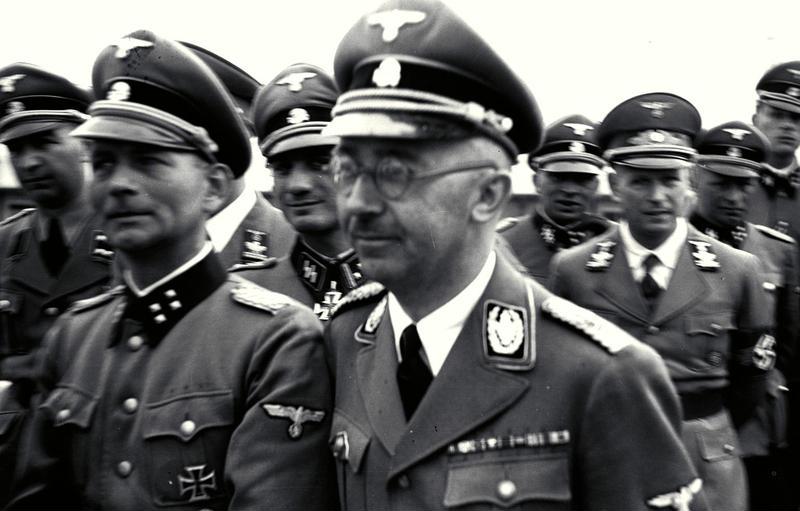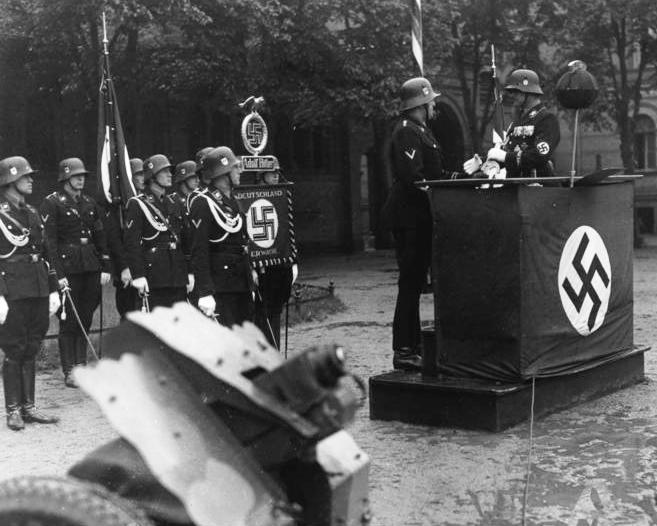|
Bernhard Siebken
__NOTOC__ Bernhard Siebken (4 April 1910 – 20 January 1949) was a German SS commander during World War II and a convicted war criminal. He was sentenced to death for the killing of Canadian prisoners of war and was executed in 1949. Siebken was one of the original members of the Leibstandarte SS Adolf Hitler (LSSAH). He took part in the invasion of Poland in 1939 and went on to serve on the Eastern Front. In 1944, Seibken commanded the 2nd Battalion, 26th SS Panzer Grenadier Regiment and later the 25th SS Panzer Grenadier Regiment; both with the SS Division Hitlerjugend. Siebken was awarded the Knight's Cross of the Iron Cross on 17 April 1945. After the end of the war, he stood trial for war crimes related to his activities while in command of the 2nd Battalion, 26th Panzer Grenadier Regiment of the LSSAH. He was found guilty in the shootings of Canadian prisoners of war from the Queen's Own Rifles during the Battle of Le Mesnil-Patry and hanged on 20 January 1949. Follow ... [...More Info...] [...Related Items...] OR: [Wikipedia] [Google] [Baidu] |
HIAG
HIAG (german: Hilfsgemeinschaft auf Gegenseitigkeit der Angehörigen der ehemaligen Waffen-SS, lit=Mutual aid association of former Waffen-SS members) was a lobby group and a denialist veterans' organisation founded by former high-ranking Waffen-SS personnel in West Germany in 1951. Its main objective was to achieve legal, economic, and historical rehabilitation of the Waffen-SS. To achieve these aims, the organisation used contacts with political parties, and employed multi-prong historical negationism and propaganda efforts, including periodicals, books, and public speeches. A HIAG-owned publishing house, Munin Verlag, served as a platform for its publicity. This extensive body of work, 57 book titles and more than 50 years of monthly periodicals, has been described by historians as revisionist apologia. Always in touch with its members' Nazi past, HIAG was a subject of significant controversy, both in West Germany and abroad. The organisation drifted into open far-right e ... [...More Info...] [...Related Items...] OR: [Wikipedia] [Google] [Baidu] |
Eastern Front (World War II)
The Eastern Front of World War II was a theatre of conflict between the European Axis powers against the Soviet Union (USSR), Poland and other Allies, which encompassed Central Europe, Eastern Europe, Northeast Europe ( Baltics), and Southeast Europe (Balkans) from 22 June 1941 to 9 May 1945. It was known as the Great Patriotic War in the Soviet Union – and still is in some of its successor states, while almost everywhere else it has been called the ''Eastern Front''. In present-day German and Ukrainian historiography the name German-Soviet War is typically used. The battles on the Eastern Front of the Second World War constituted the largest military confrontation in history. They were characterised by unprecedented ferocity and brutality, wholesale destruction, mass deportations, and immense loss of life due to combat, starvation, exposure, disease, and massacres. Of the estimated 70–85 million deaths attributed to World War II, around 30 million occurred on ... [...More Info...] [...Related Items...] OR: [Wikipedia] [Google] [Baidu] |
Waffen-SS Personnel
The (, "Armed SS") was the combat branch of the Nazi Party's ''Schutzstaffel'' (SS) organisation. Its formations included men from Nazi Germany, along with volunteers and conscripts from both occupied and unoccupied lands. The grew from three regiments to over 38 divisions during World War II, and served alongside the German Army (''Heer''), ''Ordnungspolizei'' (uniformed police) and other security units. Originally, it was under the control of the (SS operational command office) beneath Heinrich Himmler, the head of the SS. With the start of World War II, tactical control was exercised by the (OKW, "High Command of the Armed Forces"), with some units being subordinated to (Command Staff Reichsführer-SS) directly under Himmler's control. Initially, in keeping with the racial policy of Nazi Germany, membership was open only to people of Germanic origin (so-called " Aryan ancestry"). The rules were partially relaxed in 1940, and after the Operation Barbarossa invasion o ... [...More Info...] [...Related Items...] OR: [Wikipedia] [Google] [Baidu] |
Executed People From Schleswig-Holstein
Capital punishment, also known as the death penalty, is the state-sanctioned practice of deliberately killing a person as a punishment for an actual or supposed crime, usually following an authorized, rule-governed process to conclude that the person is responsible for violating norms that warrant said punishment. The sentence ordering that an offender is to be punished in such a manner is known as a death sentence, and the act of carrying out the sentence is known as an execution. A prisoner who has been sentenced to death and awaits execution is ''condemned'' and is commonly referred to as being "on death row". Crimes that are punishable by death are known as ''capital crimes'', ''capital offences'', or ''capital felonies'', and vary depending on the jurisdiction, but commonly include serious crimes against the person, such as murder, mass murder, aggravated cases of rape (often including child sexual abuse), terrorism, aircraft hijacking, war crimes, crimes against ... [...More Info...] [...Related Items...] OR: [Wikipedia] [Google] [Baidu] |
People From The Province Of Schleswig-Holstein
A person ( : people) is a being that has certain capacities or attributes such as reason, morality, consciousness or self-consciousness, and being a part of a culturally established form of social relations such as kinship, ownership of property, or legal responsibility. The defining features of personhood and, consequently, what makes a person count as a person, differ widely among cultures and contexts. In addition to the question of personhood, of what makes a being count as a person to begin with, there are further questions about personal identity and self: both about what makes any particular person that particular person instead of another, and about what makes a person at one time the same person as they were or will be at another time despite any intervening changes. The plural form "people" is often used to refer to an entire nation or ethnic group (as in "a people"), and this was the original meaning of the word; it subsequently acquired its use as a plural form of p ... [...More Info...] [...Related Items...] OR: [Wikipedia] [Google] [Baidu] |
People From Pinneberg
A person ( : people) is a being that has certain capacities or attributes such as reason, morality, consciousness or self-consciousness, and being a part of a culturally established form of social relations such as kinship, ownership of property, or legal responsibility. The defining features of personhood and, consequently, what makes a person count as a person, differ widely among cultures and contexts. In addition to the question of personhood, of what makes a being count as a person to begin with, there are further questions about personal identity and self: both about what makes any particular person that particular person instead of another, and about what makes a person at one time the same person as they were or will be at another time despite any intervening changes. The plural form "people" is often used to refer to an entire nation or ethnic group (as in "a people"), and this was the original meaning of the word; it subsequently acquired its use as a plural form of ... [...More Info...] [...Related Items...] OR: [Wikipedia] [Google] [Baidu] |
1949 Deaths
Events January * January 1 – A United Nations-sponsored ceasefire brings an end to the Indo-Pakistani War of 1947. The war results in a stalemate and the division of Kashmir, which still continues as of 2022. * January 2 – Luis Muñoz Marín becomes the first democratically elected Governor of Puerto Rico. * January 11 – The first "networked" television broadcasts take place, as KDKA-TV in Pittsburgh, Pennsylvania goes on the air, connecting east coast and mid-west programming in the United States. * January 16 – Şemsettin Günaltay forms the new government of Turkey. It is the 18th government, last single party government of the Republican People's Party. * January 17 – The first VW Type 1 to arrive in the United States, a 1948 model, is brought to New York by Dutch businessman Ben Pon. Unable to interest dealers or importers in the Volkswagen, Pon sells the sample car to pay his travel expenses. Only two 1949 models are sold in Americ ... [...More Info...] [...Related Items...] OR: [Wikipedia] [Google] [Baidu] |
1910 Births
Year 191 ( CXCI) was a common year starting on Friday (link will display the full calendar) of the Julian calendar. At the time, it was known as the Year of the Consulship of Apronianus and Bradua (or, less frequently, year 944 ''Ab urbe condita''). The denomination 191 for this year has been used since the early medieval period, when the Anno Domini calendar era became the prevalent method in Europe for naming years. Events By place Parthia * King Vologases IV of Parthia dies after a 44-year reign, and is succeeded by his son Vologases V. China * A coalition of Chinese warlords from the east of Hangu Pass launches a punitive campaign against the warlord Dong Zhuo, who seized control of the central government in 189, and held the figurehead Emperor Xian hostage. After suffering some defeats against the coalition forces, Dong Zhuo forcefully relocates the imperial capital from Luoyang to Chang'an. Before leaving, Dong Zhuo orders his troops to loot the tombs of t ... [...More Info...] [...Related Items...] OR: [Wikipedia] [Google] [Baidu] |
Nazi
Nazism ( ; german: Nazismus), the common name in English for National Socialism (german: Nationalsozialismus, ), is the far-right totalitarian political ideology and practices associated with Adolf Hitler and the Nazi Party (NSDAP) in Nazi Germany. During Hitler's rise to power in 1930s Europe, it was frequently referred to as Hitlerism (german: Hitlerfaschismus). The later related term " neo-Nazism" is applied to other far-right groups with similar ideas which formed after the Second World War. Nazism is a form of fascism, with disdain for liberal democracy and the parliamentary system. It incorporates a dictatorship, fervent antisemitism, anti-communism, scientific racism, and the use of eugenics into its creed. Its extreme nationalism originated in pan-Germanism and the ethno-nationalist '' Völkisch'' movement which had been a prominent aspect of German nationalism since the late 19th century, and it was strongly influenced by the paramilitary groups that ... [...More Info...] [...Related Items...] OR: [Wikipedia] [Google] [Baidu] |




_1938.jpg)
